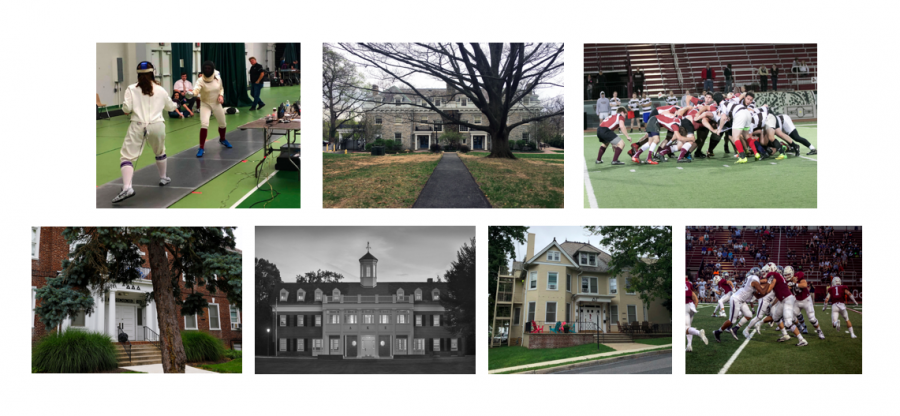The college has said which organizations were ultimately found responsible for the charges of hazing brought against them. College officials said on Wednesday they expected to update the online hazing report with this information in the coming days.
Assistant Dean of Students Jennifer Dize and Vice President of Campus Life Annette Diorio said that after reviewing the report and answering questions from The Lafayette, they realized certain components of the report may be unclear. The report is mandated by the newly-enacted Pennsylvania Timothy J. Piazza Anti-Hazing Law, and the college must update it biannually.
Being charged does not mean that an organization was found responsible for the charge. College officials determine responsibility at student conduct hearings.
In an effort to be fair to the organizations involved, Diorio and Dize said they decided to share for which charges organizations were found responsible. The only organization that was charged with hazing but not found responsible for it was men’s club rugby, but they were found responsible for three alcohol violations.
Zeta Psi, Delta Kappa Epsilon (DKE), the fencing team and Delta Gamma were all found responsible for hazing, and each was also found responsible for at least one alcohol violation. The football team and Tri Delta were both investigated but were not charged.
Whether or not Greek organizations were on probation in the past can be viewed in the Greek Life conduct report on Lafayette’s website, Diorio said, but the college did not include the charges against the organizations “because we didn’t have to.” Now, the college must disclose all incidents of hazing reported, according to Jennifer Kocher, Communications Director for state senate majority leader Jake Corman, who introduced the new law. She added there were no penalties for schools that failed to comply with the reporting requirements of the law.
Not all charges listed on the report were investigated at the same time. Zeta Psi’s charge of hazing was investigated the semester before the three alcohol charges were brought against them. The sum of all these charges prompted a five-year suspension after a year and half long process which included an appeal, Diorio said.
While men’s rugby was charged with hazing, they were only found responsible for the three alcohol violations, according to Dize.
Captain of the fencing team Andrew Mange ‘19 said that while fencing was found responsible for hazing, some of the initial complaints listed in the report were ultimately deemed not credible. Team members pointed out inconsistencies in the original complaints which discredited portions of it, he said.
For example, the original complaint against fencing claimed that “costumes were demanded on short notice.” Mange said that the party was simply a Halloween party, where all were suggested to dress up as an afterthought. He added that both student conduct and the team agreed that the allegation of newer members being treated differently was also not credible.
Dize and Diorio said that the revised report will not list which complaints were found to be credible or not credible, as it would be too difficult to do so in a clear enough manner.
While fencing was suspended at the time charges were brought, Diorio said that it’s not a hard and fast rule that teams are suspended at the commencement of an investigation. She added that such a decision is made on a case-by-case basis.
Mange said that the fencing team felt the investigation may have persisted too long.
“Our feeling at the time was the process took a lot longer than it should have, because if they had come to the team and said, ‘This is the list of allegations, do you admit them or not admit them?’ Very quickly, I think we could’ve come to the same place that we did at the end of it, which was [agreeing] the team had provided alcohol.”
He added that the violation was “about as minor as you could get for the hazing policy,” and hinged on the fact that team captains at the time provided alcohol at an event where team members were present.
“The college’s reasonable position was that if a captain hosts it and team members are invited, it’s a team event, even though half the people there weren’t associated with the team,” Mange added. He said he was not present at the party in question.
The team’s previous fencing head coach, Jarrod Rottau, left the program in spring 2017. He said that he “was never made aware of any kind of problematic culture with alcohol or social activities outside practice.” He added that the program needed to rebuild a bit in recent years, and he saw senior leadership step up each year to help the underclassmen “to the best of their ability.”
Current fencing head coach Natalie Kolasa did not respond for comment in time for print. Men’s rugby captain from 2017, John Walker ’17, declined to comment on the incident involving the team. Alumni of DKE who were on campus during the time of the organization’s incident did not respond for comment in time for print. The president of Zeta Psi did not respond for comment in time for print.
Kathryn Kelly ’19 is a member of Tri Delta and did not contribute reporting about events related to Tri Delta. News Editor Ben Fuller ’21 contributed reporting about events related to Tri Delta.





















































































































